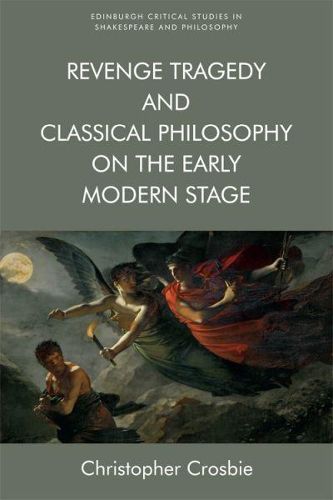Readings Newsletter
Become a Readings Member to make your shopping experience even easier.
Sign in or sign up for free!
You’re not far away from qualifying for FREE standard shipping within Australia
You’ve qualified for FREE standard shipping within Australia
The cart is loading…






Examines the influence of classical philosophy on revenge narratives by Shakespeare and his contemporaries
This book discovers within early modern revenge tragedy the surprising shaping presence of a wide array of classical philosophies not commonly affiliated with the genre. By recovering the pervasive influence of Aristotelian faculty psychology on The Spanish Tragedy, Aristotelian ethics on Titus Andronicus, Lucretian atomism on Hamlet, Galenic pneumatics on Antonio’s Revenge and Epictetian Stoicism on The Duchess of Malfi, Crosbie reveals how the very atmospheres and ontological assumptions of revenge tragedy exert their own kind of conditioning dramaturgical force. The book also revitalises our understanding of how the Renaissance stage, even at its most lurid, functions as a unique space for the era’s practical, vernacular engagement with received philosophy.
Key Features
Analyzes the twentieth-century development of revenge tragedy as a genre, and diagnoses the roots of modern criticism’s tendency to treat most philosophy as estranged from the violent work of revenge Provides fresh readings of five plays central to the revenge tragedy genre, paying close attention to the conditioning influence of classical philosophy on their narratives of retribution Reveals how revenge tragedy’s distinctive ‘moods’ or ‘atmospheres’ emerge from fully-realized sets of ontological assumptions which help shape reception of retribution on the early modern stage Develops new reception histories for five classical philosophical doctrines, revealing their currency and, what’s more, radical adaptability within early modern England
$9.00 standard shipping within Australia
FREE standard shipping within Australia for orders over $100.00
Express & International shipping calculated at checkout
Examines the influence of classical philosophy on revenge narratives by Shakespeare and his contemporaries
This book discovers within early modern revenge tragedy the surprising shaping presence of a wide array of classical philosophies not commonly affiliated with the genre. By recovering the pervasive influence of Aristotelian faculty psychology on The Spanish Tragedy, Aristotelian ethics on Titus Andronicus, Lucretian atomism on Hamlet, Galenic pneumatics on Antonio’s Revenge and Epictetian Stoicism on The Duchess of Malfi, Crosbie reveals how the very atmospheres and ontological assumptions of revenge tragedy exert their own kind of conditioning dramaturgical force. The book also revitalises our understanding of how the Renaissance stage, even at its most lurid, functions as a unique space for the era’s practical, vernacular engagement with received philosophy.
Key Features
Analyzes the twentieth-century development of revenge tragedy as a genre, and diagnoses the roots of modern criticism’s tendency to treat most philosophy as estranged from the violent work of revenge Provides fresh readings of five plays central to the revenge tragedy genre, paying close attention to the conditioning influence of classical philosophy on their narratives of retribution Reveals how revenge tragedy’s distinctive ‘moods’ or ‘atmospheres’ emerge from fully-realized sets of ontological assumptions which help shape reception of retribution on the early modern stage Develops new reception histories for five classical philosophical doctrines, revealing their currency and, what’s more, radical adaptability within early modern England